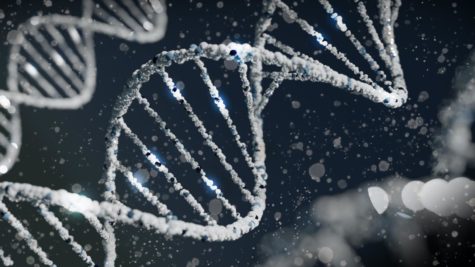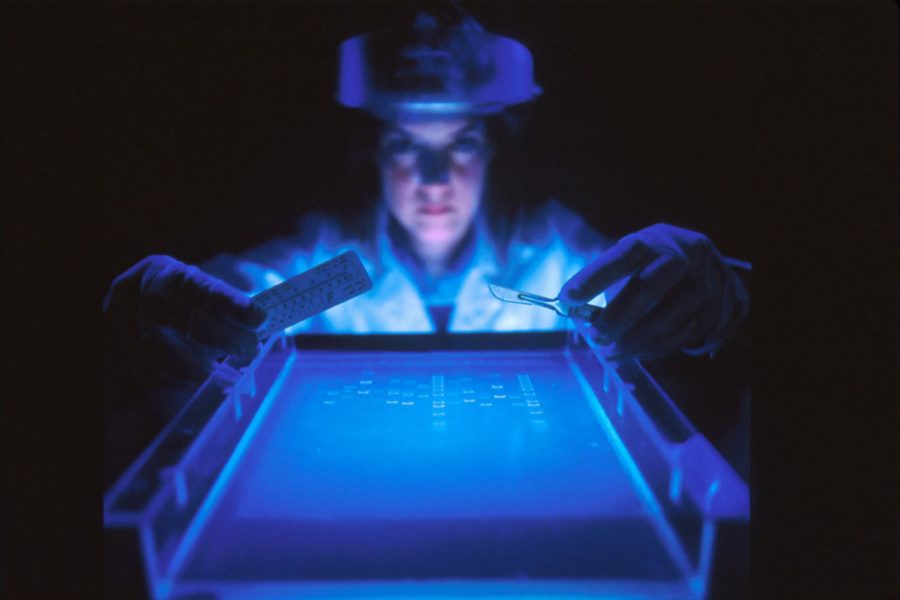23 and You – How Far are Biotech Companies Willing to Go With Your DNA?
An investigation and interpretation of 23 and Me ancestry and health testing along with the future of at-home self administered genetic testing.
Photo by National Cancer Institute / Unsplash
“My mom has a younger sister who was put up for adoption because of the one-child policy in China. Her parents already had two children, and there was a costly fine for each additional child…My grandfather recently set up an ancestry account to see if he could find his daughter and checks it often to see if she was identified. They haven’t found her yet, but he still has hope,” said Vivian Zou ’23.

Opening my beat-up Macbook, I make an electronic beeline for Google and type the all-too-familiar number 2 in my web browser, autofill bringing me to 23andMe’s official site. Over the last seven weeks, I had anxiously awaited the grand reveal of my ancestry kit’s results, as if a shocking revelation would stem from the pie chart and I would suddenly have claims to a royal throne. At the center of it all, people engage with ancestry tests because they want to discover new and exciting parts of themselves, and 23andMe offers a new perspective of self (or so they advertise).
The concept of monitoring and altering genetic makeup predates contemporary BioTech, with predictions within literature providing social commentary against a changing world. Science fiction explores the futuristic and complex world of scientific and technological applications.
For instance, in Brave New World, Aldous Huxley creates a satirical yet eerily accurate description of genetic engineering and its impact on social hierarchy. “‘Ninety-six identical twins working ninety-six identical machines!’ The voice was almost tremulous with enthusiasm. ‘You really know where you are. For the first time in history.’… ‘If we could bokanovskify indefinitely, the whole problem would be solved.’”
Scientists have recently criticized genealogical studies as an attempt to maximize hierarchical efficiency and present the event as a rising reality. As noted in the National Library of Medicine, “While the definition of perfection may be subjective, humans since time immemorial have sought any advantage to enhance their quality of life and to raise children that are physically and intellectually better than themselves…Human enhancement aims to improve or extend human physical, intellectual, psychological, or moral characteristics beyond a normal range,” emphasizing moral conflict as an ongoing debate for genealogical testing.
23andMe, a leading BioTech company, was created with the goal of providing customers with accurate, in-home testing for health conditions and genetic reviewing. Founder Anne Wojcicki, one of many entrepreneurs in the biotech industry in the early 2000s, introduced her revolutionary healthcare concepts to households nation-wide. Since then, 23 and Me expanded to include ancestry lineage testing, along with other companies, like Ancestry.com According to their official site, “the mission of the company is to help people access, understand and benefit from the human genome. 23andMe offers two saliva-based, over-the-counter genotyping services: Health + Ancestry Service or an Ancestry + Traits Service option.”
However, the accuracy and ethics of the tests have long been fighting against larger launch plans. According to Scientific American, “Genetics is a probabilistic science, and there are no genes ‘for’ anything in particular.” Regardless of the major breakthroughs in trait testing, a popular aspect of the 23 and Me’s site, users should remain cautious about referring to them to identify and even confirm characteristics.
Ranging from quirky skills (Can I match musical pitch?) to more serious (Mosquito Bite Frequency), 23 and Me heavily relies on an unpredictable method — their long and extremely detailed surveys — to produce the traits section. Survey fatigue, miscommunication, and opinion may interfere and create response bias.
As noted in EdTechBooks, “This is related to sampling error, in that it can affect the generalizability of the results, but it is slightly different. If the group of respondents you invite to take your survey would likely form a representative sample of the population, but several individuals choose not to respond to the survey, the results may not be generalizable.” Further, as noted in SRG, the specificity of the genetic testing has also been reviewed, “if test results state that a person is 5% Native American, for example, the customer won’t know which side of the family it comes from unless both of their parents get tested, too.”
When conducting my own 23 and Me test, I unlocked the “Relatives” feature, which connects me with other living relatives, making a world map of where they currently live. I was surprised to see I had over a hundred relatives spread across Europe and the Americas, especially that I had relatives in North America since my parents were both the only ones in their families to immigrate to the U.S. Almost all of them were fourth generation cousins, with no specifications on where they are from.
The consequences of trusting 23 and Me with your personal health information can have further implications than misreporting a fear of heights; it can change your life. As noted by the Markkula Center for Applied Ethics at Santa Clara University, “These tests can detect the presence of genetic abnormalities in healthy individuals… In the workplace, such tests can be used to screen job applicants and employees who, because of their genetic makeup, may be more likely to develop diseases if exposed to certain worksite substances, such as chemicals or radiation.”
Ancestry, a separate lineage testing website, faced a lawsuit for publishing private genetic results, accrediting the sites for being the reason for job exclusion. As noted by the Markkula Center for Applied Ethics at Santa Clara University,“Once the company has your information, there is no guarantee it will remain confidential. HIPAA (the Health Insurance Portability and Accountability Act) does not apply to tests purchased directly from a DTC company. That means a company can share your genetic information freely.”
But lineage testing has also served as a beacon of hope for families like Vivian Zou’s ’23. “My mom has a younger sister who was put up for adoption because of the one-child policy in China. Her parents already had two children, and there was a costly fine for each additional child. My grandfather recently set up an ancestry account to see if he could find his daughter and checks it often to see if she was identified. They haven’t found her yet, but he still has hope,” Zou said.
Ancestry testing has also been reuniting families — and bridging gaps in lost history. As noted by WHYY/PBS, “During slavery, Black families were constantly being separated, with many enslaved children being raised away from their biological parents. So informal adoptions during and after slavery were very common among African Americans. In other words, paper records have their limits.” Academics have time and time again acknowledged the divide between scientific and cultural truth about lineage for Black communities living in America. While horrific tragedies such as slavery and Native American displacement are taught, descendants often have not faced the impacts history has had on their own background.
Despite the controversies surrounding 23 and Me and other lineage websites, DNA testing remains an incredible scientific tool that can be applied to uncover health benefits and lead critical identity and cultural discussions surrounding communities that have had their stories suppressed from sharing, bringing healing and closure to those willing to face their truths and learn their history.
Ancestry testing has also been reuniting families — and bridging gaps in lost history.
Camila Kulahlioglu is an Editor-in-Chief for ‘The Science Survey.’ She hopes that her writing will inspire her peers to find new literary passions...

